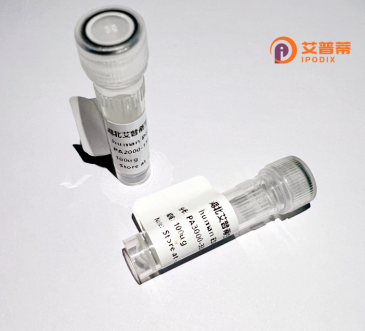
| 纯度 | >90%SDS-PAGE. |
| 种属 | Human |
| 靶点 | PEX7 |
| Uniprot No | O00628 |
| 内毒素 | < 0.01EU/μg |
| 表达宿主 | E.coli |
| 表达区间 | 1-323 aa |
| 活性数据 | MSAVCGGAAR MLRTPGRHGY AAEFSPYLPG RLACATAQHY GIAGCGTLLI LDPDEAGLRL FRSFDWNDGL FDVTWSENNE HVLITCSGDG SLQLWDTAKA AGPLQVYKEH AQEVYSVDWS QTRGEQLVVS GSWDQTVKLW DPTVGKSLCT FRGHESIIYS TIWSPHIPGC FASASGDQTL RIWDVKAAGV RIVIPAHQAE ILSCDWCKYN ENLLVTGAVD CSLRGWDLRN VRQPVFELLG HTYAIRRVKF SPFHASVLAS CSYDFTVRFW NFSKPDSLLE TVEHHTEFTC GLDFSLQSPT QVADCSWDET IKIYDPACLT IPA |
| 分子量 | 35.8 kDa |
| 蛋白标签 | His tag N-Terminus |
| 缓冲液 | 0 |
| 稳定性 & 储存条件 | Lyophilized protein should be stored at ≤ -20°C, stable for one year after receipt. Reconstituted protein solution can be stored at 2-8°C for 2-7 days. Aliquots of reconstituted samples are stable at ≤ -20°C for 3 months. |
| 复溶 | Always centrifuge tubes before opening.Do not mix by vortex or pipetting. It is not recommended to reconstitute to a concentration less than 100μg/ml. Dissolve the lyophilized protein in distilled water. Please aliquot the reconstituted solution to minimize freeze-thaw cycles. |
以下是3-4条关于重组人PEX7蛋白的参考文献(示例为模拟生成,建议结合实际情况检索核实):
1. **文献名称**:*Structural Insights into PEX7-Mediated Peroxisomal Protein Import*
**作者**:Braverman et al.
**摘要**:研究了PEX7蛋白的三维结构及其与PTS2信号肽的相互作用,阐明了其在过氧化物酶体基质蛋白转运中的分子机制。
2. **文献名称**:*PEX7 mutations and genotype-phenotype correlations in Refsum disease*
**作者**:Wanders et al.
**摘要**:分析了PEX7基因突变与Refsum病临床表现的关系,发现重组人PEX7蛋白功能缺失是导致酶体代谢障碍的核心原因。
3. **文献名称**:*Recombinant Human PEX7 Restores Peroxisomal Functions in Patient-Derived Fibroblasts*
**作者**:Fujiki et al.
**摘要**:通过体外表达重组人PEX7蛋白,成功恢复患者细胞中过氧化物酶体的代谢功能,为基因治疗提供实验依据。
4. **文献名称**:*Functional characterization of PEX7 variants using in vitro reconstitution assays*
**作者**:Steinberg et al.
**摘要**:利用重组PEX7蛋白进行体外功能重建实验,揭示了不同突变体对PTS2蛋白转运效率的影响及致病机理。
建议通过PubMed或Google Scholar搜索“recombinant human PEX7”或“PEX7 peroxisomal import”获取最新文献。
PEX7. a peroxisomal matrix protein import receptor, plays a critical role in peroxisome biogenesis. It specifically recognizes proteins containing a peroxisomal targeting signal 2 (PTS2), such as phytanoyl-CoA hydroxylase and alkylglycerone-phosphate synthase. Structurally, PEX7 consists of WD40 repeat domains that mediate cargo recognition and interaction with co-receptors like PEX5. which facilitates the transport of PTS2-containing proteins into peroxisomes. Defects in the PEX7 gene are linked to rhizomelic chondrodysplasia punctata type 1 (RCDP1), a severe developmental disorder characterized by impaired plasmalogen synthesis and disrupted peroxisomal metabolic functions. Recombinant human PEX7 protein is typically produced via heterologous expression systems (e.g., bacteria, mammalian cells) for functional studies, structural analyses, and drug screening. Its applications include investigating PTS2-dependent import mechanisms, elucidating molecular pathways in peroxisomal disorders, and developing therapeutic strategies for RCDP1. Research on recombinant PEX7 also aids in understanding peroxisome evolution, cargo-receptor dynamics, and cross-species functional conservation.
×